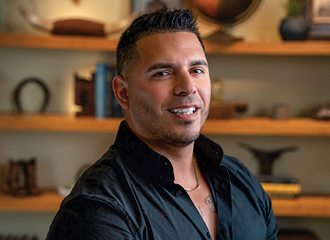Veteran Says Readiness for Support Is “Step 1” for Healing
4-minute read
Veteran Says Readiness for Support Is “Step 1” for Healing
4-minute read
When Stefan first met with mental health counselors for an evaluation—in response to a traumatic brain injury (TBI) diagnosis—the U.S. Marine Corps Veteran wasn’t ready to be helped. “I can’t even tell you what we talked about, because of how much I didn’t want to be there,” he recalls. “I wasn’t engaged in it.”
But when Stefan returned on his own for counseling, the result was different. “What brought me back to seeking help was recognizing that I did need help, so that’s Step 1,” Stefan says. After he returned, he was diagnosed with bipolar disorder and posttraumatic stress disorder (PTSD) in addition to his TBI. He also learned ways to manage his symptoms.
“It’s one of the best things I’ve ever done,” Stefan says. Now he says he wants to share his story to encourage other Veterans to take that first step too.

Marine on Getting Support: “It’s one of the best things I’ve ever done.”
Following a family tradition
Stefan joined the Marines in 2010, carrying on a proud family tradition of military service that to him felt like a calling. But Stefan says it became mentally taxing to be deployed in Afghanistan without receiving satisfactory answers to his questions about the purpose of the mission, and this feeling was compounded by a friend’s death on the deployment.
“To lose a friend without knowing the why behind, a true why, gets your brain ticking a little bit,” he says. “Anything traumatic like that will have an impact on anyone.”
Stefan says his transition to civilian life in 2015 was simple in some respects. Having lined up a job 8 months before completing his service, he didn’t have to worry about finding a new source of income or paying for a place to live. But he did find it difficult to find a new sense of purpose.
He also didn’t recognize that he needed help until friends and co-workers told him his behaviors and reactions weren’t “normal.”
Identifying red flags
“The symptoms or red flags … was essentially to almost feel always guarded or prepared to attack,” Stefan says. He also experienced angry outbursts. However, Stefan explains, the feelings seemed normal to him because of his experience in the military.
“You’re at war, training for war, preparing for war, and everything you do is for that aspect. So it really creates this mindset, and you take that into civilian life,” he says.
Not yet diagnosed with bipolar disorder, Stefan also thought everyone experienced the extremes in emotional states that he did. “For a long time, I thought everyone acted like that, very hot and cold,” he says. “I could be on a downward spiral for months at a time.”
Finding solutions through talk therapy
Once he became more open to treatment, Stefan found his way. Engaging in nonjudgmental conversations with a therapist helped him open up, he says, and therapy provided him with tools to become more aware of his symptoms and manage them when they surfaced.
“After understanding it [the depressive episode] and what makes it tick a little bit, I was able to reduce months down to weeks, weeks down to days,” Stefan says. “I’m able to get right back up on my feet a lot quicker than I used to be, understanding what I’m going through and how I’m going through it.”
As he became aware of his triggers for angry outbursts, Stefan communicated those triggers to friends and loved ones, who helped him identify when they occurred. That has helped him step back from his emotions and employ techniques he learned in therapy. “I am training my mind to kick in and do what I’m supposed to do,” he says.
Stefan continues to receive therapy once a week or more, using telehealth visits to make the frequency more manageable. Consistency is the key, he says.
“Sometimes I’m feeling on top of the world and that once a week is all I need,” he says. When he’s going through a tough time, he may increase the frequency. “Sometimes I ask for a little bit of homework, maybe a little extra assignment,” he says.
“I do homework often,” he adds. “It’s what helps me. ... If I stay on top of it every day, it directly translates into my life being happier.”

